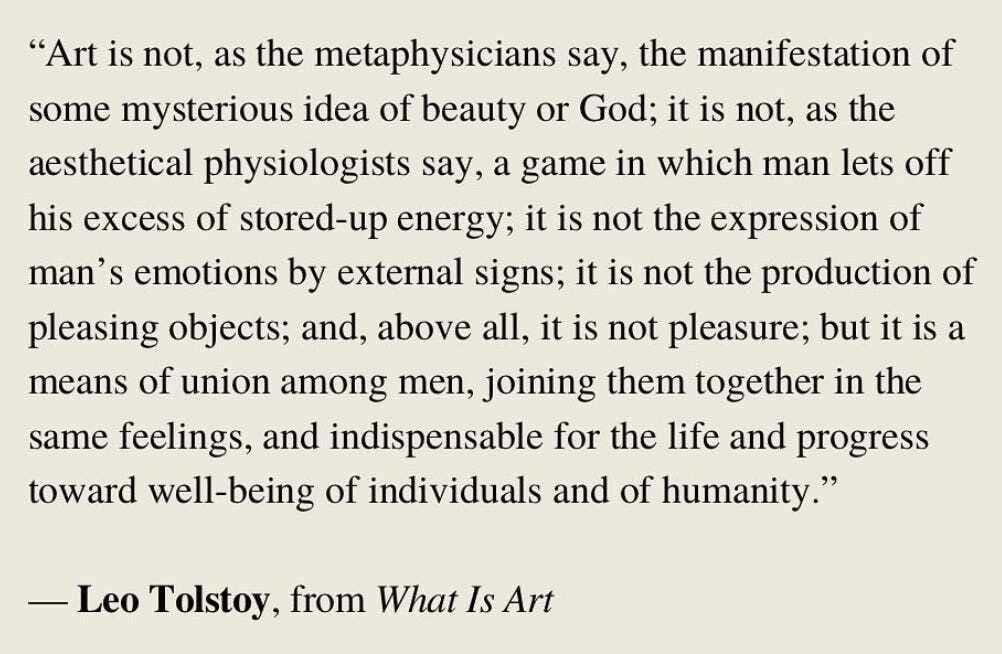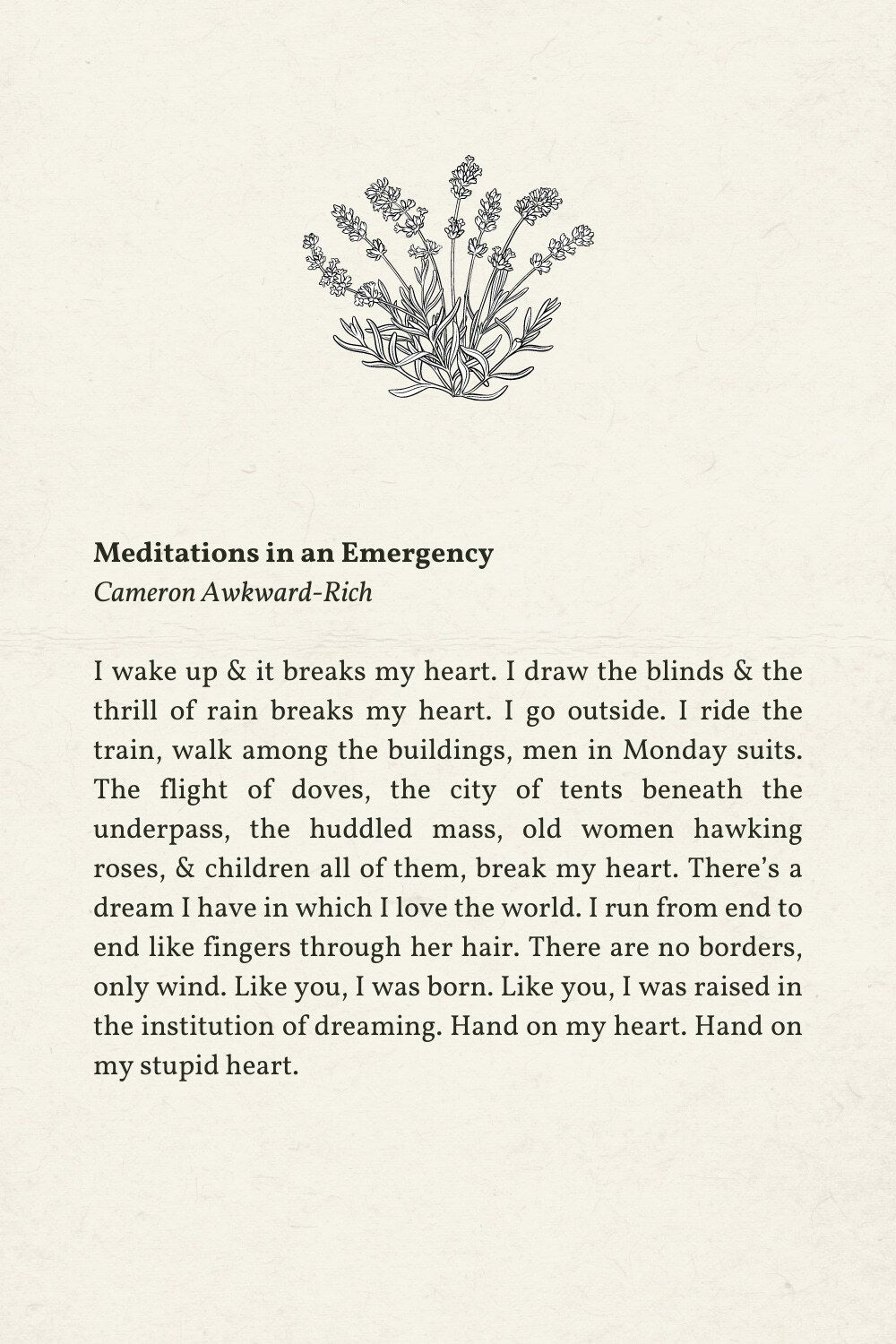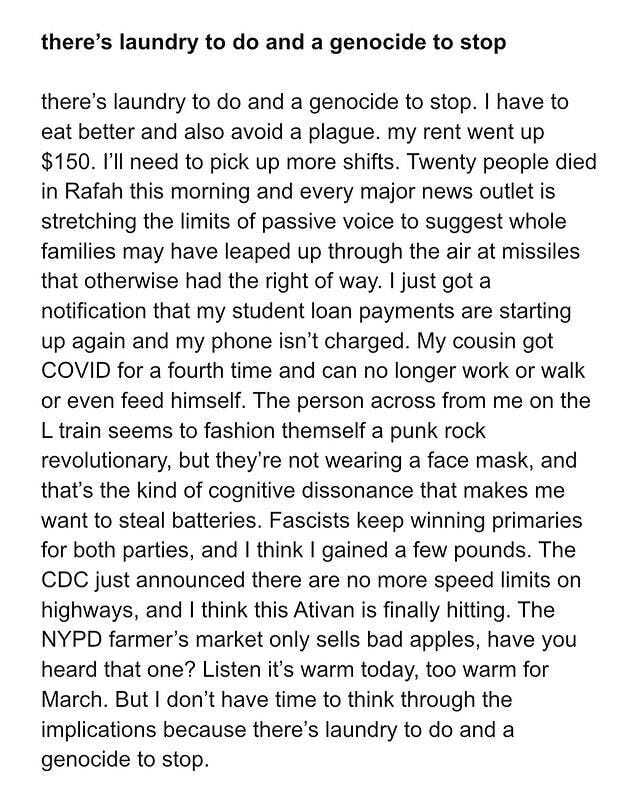- Creativity for Good
- Posts
- hand on my stupid heart
hand on my stupid heart
on creating, for the sake of creating, because it matters.
A few weeks back, I noticed a poem going around my social media feeds — “there’s laundry to do and a genocide to stop” by Vinay Krishnan, a writer, mental health advocate, and the National Field Organizer for the Center for Popular Democracy.
Because I love suffering and have only bad internet habits, I then looked at the comments (note: nothing good ever comes from this, and my therapist would love me to stop, but alas, here we are), and found — looking post the usual COVID denial, and genocide denial, and MAGA voters, etc etc etc — a rather robust, and honestly kind of mean, conversation about whether or not this was poetry.
Full disclosure: I actually loved this poem. The constant awareness of death and suffering and grief and pain that can’t be shaken off, even as we go through the day-to-day motions of chores and work and parenting and bill-paying and commuting — it’s a very real, relatable feeling, one I sensed, but hadn’t yet put into words in any concrete way. I’m also, full disclosure again, someone who loves poetry very much, but would never call myself a poet of any skill. I aspire, etc, but I’m not there.
All of that said: I actually don’t think anything good comes from gatekeeping any form of art, poetry included. If someone feels like they’ve written a poem, then, as far as I’m concerned, they’ve written a poem. We can debate whether or not they’ve written a “good” poem until we’re blue in the face, but whether or not it’s a poem at all isn’t up to the audience. It’s up to the creator.

In a recent newsletter, writer and astrologer Chani Nicholas noted that as Venus enters Pisces (where she’ll stay from March 11 to April 4, 2024), it “heralds a time when the necessity of beauty, love, and connection — and the healing power of art — reign supreme.” She goes on to remind us of an often-shared quote from Toni Morrison, one that many of us have seen frequently since October 7:
“This is precisely the time when artists go to work. There is no time for despair, no place for self-pity, no need for silence, no room for fear. We speak, we write, we do language. That is how civilizations heal.”
Now is not the time to gatekeep your creativity. Now is not the time to wonder, “is this good? Am I doing this right?” Creativity is how we make sense of the world around us; it’s how we process grief and channel anger and cling to hope and celebrate beauty; it’s how we invite others to sit in those moments with us, to find themselves seen, to witness a mirror of their own hearts reflected back at them. There will always be time for creative works that are polished, perfected, MFA-approved — and sometimes we see those works emerge in these messy, heartbreaking, horrible times, and wonder why we can’t create what they’re creating, why our words don’t flow like theirs, why our syntax is too messy and our meter too uncertain and our prose too purple and our imagery too cliche.
But here is the secret: Your voice may not be polished or perfect or MFA-approved (even if you have that MFA!). What matters is that it’s yours.
It’s hard to turn off that inner critic. An unfortunate side effect of spending time in even the most loving and supportive creative communities is the tendency to self-compare — to look at the creative works coming from your friends and mentors and community members and find your own works wanting. The venn diagram between creatives and perfectionists isn’t a circle, but there’s definitely overlap, especially when it comes to pieces we plan to share. We don’t want them to just exist, we want them to be good.
When we give in to that critic, though — when we’re so focused on doing it right that we can’t bring ourselves to do it at all — the stories (or poems, or visual art, or music, or movement, or, or, or) bubbling inside us have nowhere to go. We get caught in a vicious cycle of self-silencing, self-rejecting.
Someone else has already said what we want to say, we think, and they’ve said it better. More beautifully. In a way that’s more moving. They’ve written a good poem.
And fine — maybe they have. When I first came across Vinay Krishnan’s poem, linked above, I’ll be honest: The first thing that came to mind was, “This is basically just a less optimistic version of ‘Meditations in an Emergency,’ isn’t it?”

But honestly? It doesn’t matter if “there’s laundry to do and a genocide to stop” and “Meditations on an Emergency” come from the same place, use the same framing, express the same yearning, the same heartache. The truth is that there are a thousand versions of this sentiment, turned into a thousand poems, a thousand stories, a thousand paintings, and yes — some of them are “good,” and some of them are “bad.” But unless they’re word-for-word plagiarized, no two pieces will ever resonate in the exact same way, or say the exact same thing, or evoke the exact same feeling.
So consider this your formal permission: Write the poem, no matter how bad it is. Write that self-indulgent fanfic. Take that photo. Decorate those cupcakes. Paint that picture. Knit those socks. Create something.
Let the critics critique, let the haters hate. Tune them out. Because hand on my heart, hand on my stupid heart, I believe this:
Your voice, your work, your creativity — it deserves to exist.
questions on creating for good
Where are you self-silencing?
What have you stopped yourself from creating because you feel like someone else has created a better, more meaningful, or more perfect version? What is it about that person’s work that makes you feel that way?
What is resonating?
What was the last creative work that made you feel something? What part of that work brought out that emotion?
What are you holding back?
What do you wish you could create right now? What is bubbling inside you that you wish you could express? Where do you feel it inside you? What would it feel like to release your inner critic, and turn that feeling into something new?
resources, links, and further reading
spotlight on: creativity without judgment
read:
“On Hating Rupi Kaur” (johnathan riley for barnstorm journal)
“the shortest path to creativity” ( for ), specifically this quote:
“commit to being haunted” ( for )
watch: “understanding poetry” from Dead Poet’s Society
donate: any of these trans rights organizations, compiled as part of the #TransRightsReadathon, which begins march 22, 2024!
